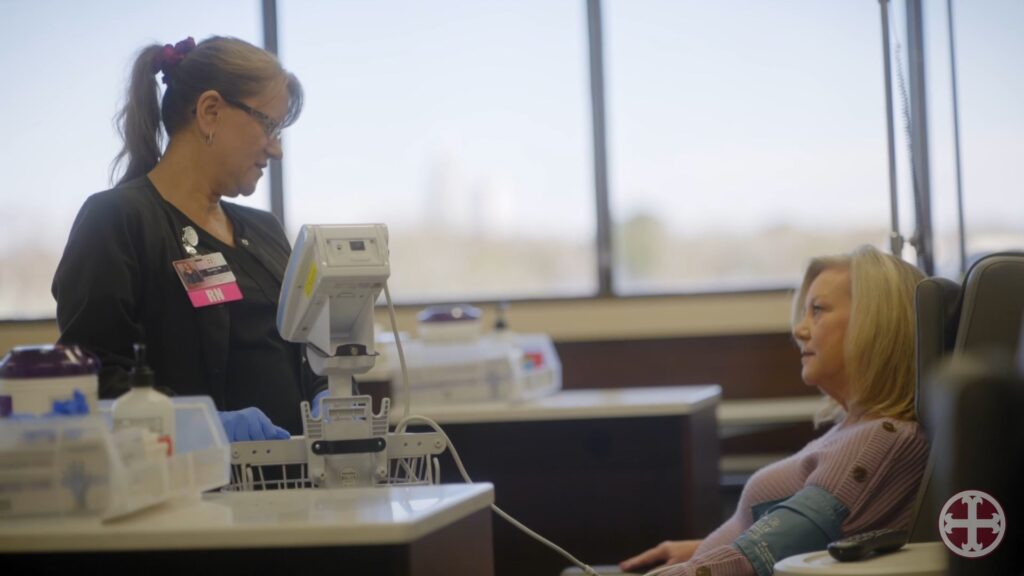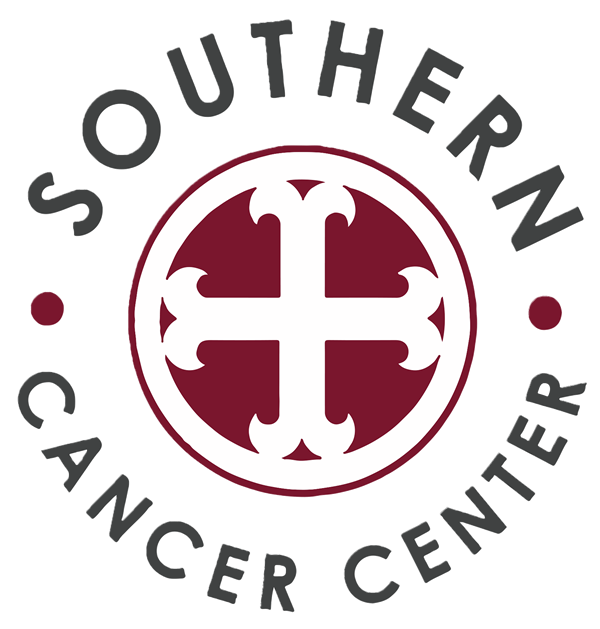Understanding Chemotherapy
Chemotherapy is the treatment of cancer with drugs that can destroy cancer cells. Most people are unaware that chemotherapy can be given in a number of different ways such as intravenous (IV) chemotherapy, continuous infusion, and oral chemotherapy.

Types of Treatment
- Intravenous (IV) chemotherapy where drugs are given directly into the bloodstream through an IV. These drugs can be administered over minutes to hours, depending on the medication.
- Continuous infusion where drugs are given slowly over several days using a pump.
- Oral chemotherapy refers to drugs that can be taken by mouth as pills or liquid. Southern Cancer Center has an on-site pharmacy located on our Daphne campus. You can learn more about Coastal Pharmacy and the services provided here.
What to Expect
Chemotherapy is given in different sessions over one or more days. These sessions are grouped together and referred to as a “cycle.” Each cycle of chemotherapy is repeated a set number of times with a gap in between. The time between cycles varies based on the type of chemotherapy, but generally occurs every 2 to 3 weeks.
Chemotherapy is a complex process. You will have lab work performed and will be examined by a physician or nurse practitioner prior to starting your chemotherapy, and subsequently with each cycle.
The length of time you will be in the clinic for your treatment will depend on the medications prescribed. Please plan for an additional hour on your first day of treatment to allow time for medication teaching. You will be provided with drug specific information on the first day of your chemotherapy treatment. Additionally, you may refer to the Chemotherapy and You (PDF) booklet, published by the National Cancer Institute.
- Only one visitor per patient is permitted in the infusion area at a time. All visitors must be over the age of 13.
- Eat lightly, but do not skip meals prior to your infusion.
- If necessary, schedule any necessary dental work prior to beginning chemotherapy. Otherwise, it is likely you will not be permitted to have dental work done until after all treatment is complete.
- Try a stress reduction activity before chemotherapy and plan to continue this activity throughout your cancer treatment. Techniques for reducing stress can help you enjoy a better quality of life, especially in the face of illness. Learn more here about stress reduction techniques from the Mayo Clinic.
- Wear comfortable clothing and consider bringing a sweater with you. We provide warm blankets in the clinic for your comfort.
Once your infusion is complete, you will be sent home. You may find it helpful to refer back to the information provided to you during the time after chemotherapy. The Chemotherapy and You (PDF) booklet is a good resource for your reference. Refer to it and then contact our office if you don’t find answers to your questions. It is normal to be worried about the side effects of chemotherapy. Discuss your side effects and concerns with your Physician at each office visit. Remember, not all patients experience side effects. Likewise, each patient tolerates and responds to medications differently. You will receive prescriptions for nausea medications from your physician. These medications should be taken as needed according to the directions listed on the bottle. Most people require anti-nausea medications for 3-5 days following chemotherapy.
The way chemotherapy affects cells in your body can sometimes result in muscle and joint aches. It is OK to take Tylenol or Advil after chemotherapy.
You may also find it useful to refer to Eating Hints from the National Cancer Institute (PDF) for helpful tips to manage side effects. You should contact your physician if any of the following occur:
- Shaking chills or fever greater that 100.4°F. **Notify your doctor immediately if you develop a temperature, do not delay.
- Unusual cough, sore throat, lung congestion or shortness of breath
- Burning discomfort when you urinate
- Redness, pain or sores in your mouth
- Nausea, vomiting or inability to eat or drink for more than 24 hours
- Diarrhea (loose, watery stools) for more than 24 hours
- Constipation (no bowel movement in 2-3 days)
- Bleeding or unusual bruising
- Pain not controlled by your current medications
- Any new or unusual symptom that concerns you
Certain precautions should be taken to protect you and your caregivers from coming into contact with chemotherapy medications. Chemotherapy leaves the body through urine, stool, vomit, and blood. Most chemotherapy medications are out of the body in less than 48 hours. Following these precautions will help you avoid all body fluids that may contain chemotherapy.
- Hand washing is the most important way to prevent infection. Wash your hands before and after the following: preparing food, eating, going to the bathroom, touching body fluids (including blowing your nose), working with plants or soil, using gloves for a task. Antiseptic gel and lotion can be better at killing germs than soap. Do not use these products if your hands are visibly soiled or have body fluids on them.
- Place a hazardous waste container in your home to place soiled gloves, dressings, and other items that contain body wastes, such as diapers. Store these containers out of the reach of children. Your local health department can provide local codes and ordinances regarding disposal of hazardous containers. Southern Cancer Center cannot accept your container for disposal.
- Use gloves to handle laundry that is soiled with chemotherapy. Wash any soiled linens or clothing right away with regular soap in your washer. If you do not have a washer, place the soiled linens in a bag until they can be washed.
- If you get chemotherapy or body wastes on your skin, wash the area with soap and water immediately, then dry. Call your physician if there is redness or irritation on the skin that doesn’t resolve in an hour.
- It is acceptable for other members in your household to use the same toilet as long as the waste is flushed completely. If you use a bedside commode, bedpan, urinal, or basin for vomiting, wear gloves and rinse the container with water after each use. Clean it with soap and water at least once a day. If you use disposable diapers or pads, change it when it becomes soiled and wash the skin immediately with soap and water. If you have an ostomy, wear gloves when changing or emptying the device. All diapers, pads, and gloves soiled with chemotherapy wastes should be disposed of in a hazardous container.
- If body waste splashes into your eyes, flush them immediately with water for 10-15 minutes and call your doctor.
Sexual Activity, Pregnancy, and Breast Feeding
You should not have sexual intercourse for 48 hours after receiving chemotherapy. It is important to use contraception to prevent pregnancy while on chemotherapy. Two forms of birth control are recommended to avoid pregnancy when you are on these medications and for at least 6 months following treatment discontinuation. It is important to discuss any plans for pregnancy after chemotherapy with your physician. Chemotherapy can be harmful and even fatal for a developing fetus. Notify your physician immediately if pregnancy occurs. Pregnant or breast feeding women should wear gloves and gowns when caring for patients receiving chemotherapy.
Should I eat before treatment?
Please eat according to your normal schedule. Do not skip any meals and take your medications as scheduled. You might find it best to eat a light meal the day of chemotherapy. For oral chemotherapy medications, be sure to check with your doctor or pharmacist for instructions on taking these medications with regard to meals.
Can I drive myself to and from treatment?
Certain treatment protocols call for medications to be given that may make you tired and unsafe to drive. Until you know how chemotherapy will affect you, plan for a driver to accompany you. If they are unable to stay with you for the length of your infusion treatment, they should be accessible and flexible about your pick-up time. We will be happy to call your driver 30 minutes before you are finished to notify them that your treatment is nearing completion.
Is food available?
A Nutrition Station is available free of charge in the infusion area. We provide juices, sodas, and water along with chips and crackers. Depending on which location you are visiting, there may be access to vending machines or on-site cafeterias with additional food and beverage choices. It is acceptable to bring snacks and outside food or beverages with you to the infusion clinic.
Will my health insurance cover chemotherapy treatment costs?
It is important to become familiar with the specific provisions of your health insurance policy with regard to co-payments, co-insurance, and patient responsibilities for non covered or partially covered services. Southern Cancer Center has an onsite billing department that will perform benefits investigation and determine any patient responsibility before your treatment begins. We will always discuss this information with you prior to proceeding. Our patient support representatives and financial counselors will advocate on your behalf for copayment assistance or financial assistance through cancer foundations to help you obtain treatment when needed.
Is it safe to take my other medications while on chemo?
Your doctor will review your current medications prior to starting your chemotherapy. If any medications should be discontinued, you will be notified. Otherwise, continue to take all medications as prescribed until instructed otherwise. Please be sure to notify your physician or nurse when you have any changes to your current medication, including any new medications you are prescribed.
